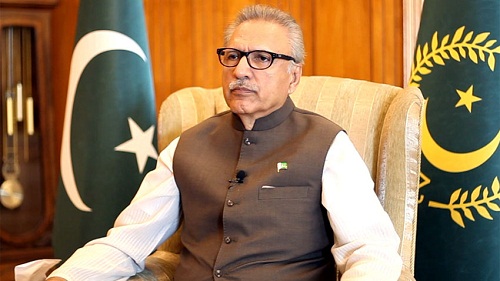ISLAMABAD, APR 30: President Arif Alvi on Sunday returned the National Accountability (Amendment) Bill, 2023 to Parliament, stating that previous amendments to the accountability laws were sub judice before the Supreme Court (SC).
Earlier this month, the bill, dubbed “part two of NRO-2” by the opposition, had sailed through the Senate without being referred to the standing committee concerned.
The bill, which had already been passed by the National Assembly, was moved in the Senate by Law Minister Azam Nazeer Tarar amid a protest by senators belonging to the PTI.
The legislation — proposed by the government in March — not only empowers the NAB chairman to transfer graft cases involving corruption of less than Rs500 million to the relevant agency, authority or department but also closes the pending inquiries and investigations where they think no case is made out.
In a tweet today, the President’s Office said: “The president sent back the bill to Parliament under Article 75 (president’s assent to bills) of the Constitution.”
Stating the reason for returning the bill, President Alvi stated that previous amendments to the NAB law were already under hearing in the Supreme Court.
“This aspect has not been addressed in the bill and the prime minister’s advice,” he said.
The president asserted that further amendments to the accountability laws “without reviewing the effects of a pending matter should be reviewed once again”.
The bill
The National Accountability (Amendment) Bill, 2023 sought amendments to several sections of the NAB Ordinance, among which those to sections 4 and 6 stand out the most.
An amendment to section 4 of the NAB law states: “If the chairman is satisfied that no case is made out against an accused and the investigation may be closed, he shall refer the matter to the Court for approval and for the release of the accused, if in custody.
“Where the chairman is of the opinion that prima facie case is made out against an accused under any other law for the time being in force, he shall refer the matter to the relevant agency, authority or department, as the case may be,” it further states.
Under a provision added to Section 6 of the NAB Ordinance, as and when the office of the NAB chairman falls vacant or when the chairman is absent or unable to perform the functions of his office — due to any action whatsoever — the deputy chairman shall act as the NAB chairman and in absence of deputy chairman, the federal government shall appoint an acting chairman from amongst the senior officers of NAB.
The bill further says that due to the amendments made to the NAB law last year, “some legal complications have arisen for transfer of those cases from the accountability courts to other courts, tribunals, and forums which do not fall within the domain or jurisdiction of the NAB Ordinance”.
“On the initiative of the Prosecutor General Accountability and after having the input of relevant stakeholders, certain further amendments in the NAB Ordinance are required to be made urgently to provide legal cover to the accountability courts for transfer of aforesaid cases”, reads the statement of objects and reasons of the bill.
Previous NAB law amendments
After coming into power in April, the incumbent coalition government had passed the National Accountability (Second Amendment) Act 2022 — a move that was heavily criticised by PTI — aiming to restrict the NAB’s role in corruption cases of over Rs500 million and taking away the president’s authority to appoint accountability court judges.
The joint session of the Parliament on June 10 approved the National Accountability (Second Amendment) Bill, 2021 which was opposed and returned unsigned by President Arif Alvi before it became law.
It states that NAB’s deputy chairman, to be appointed by the federal government, would become the acting chairman of the bureau following the completion of the tenure of the chairman.
The law also reduced the four-year term of the NAB chairman and the bureau’s prosecutor general to three years. After approval of the law, NAB will not be able to act on federal, provincial or local tax matters. Moreover, the regulatory bodies functioning in the country have also been placed out of NAB’s domain.
It says that “all pending inquiries, investigations, trials or proceedings under this ordinance, relating to persons or transactions … shall stand transferred to the concerned authorities, departments and courts under the respective laws.”
It has also set a three-year term for the judges of the accountability courts. It will also make it binding upon the courts to decide a case within one year. Under the proposed law, it has been made binding upon NAB to ensure the availability of evidence against an accused prior to his or her arrest.
According to one of the key amendments, the act “shall be deemed to have taken effect on and from the commencement of the National Accountability Ordinance 1999”.
Subsequently, PTI Chairman Imran Khan had challenged the changes to the NAB laws, contending that they would “virtually eliminate any white-collar crime committed by a public office holder”. The case is still being heard by the top court.

















